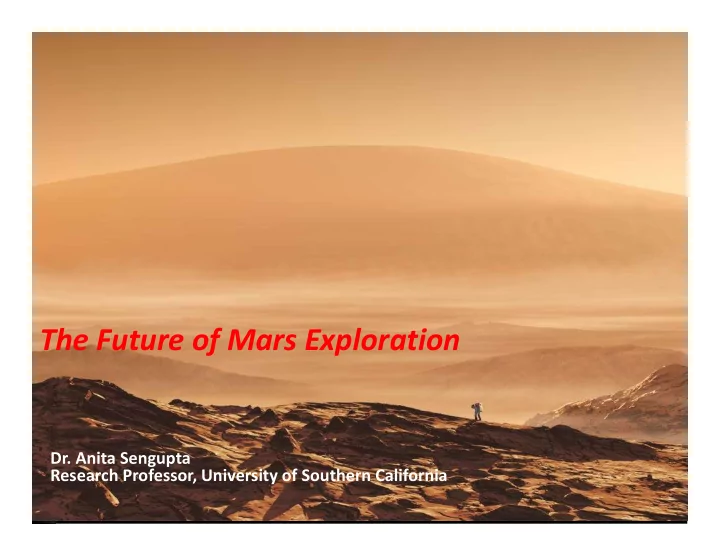

The Future of Mars Exploration Dr. Anita Sengupta Research Professor, University of Southern California
How do we land on Mars?
Why Are We so Interested In Mars? Parameter Mars Earth Distance (AU) 1.4 1 The Terrestrial Planets Look Very Different, but Mass( Earth) 1/10 1 what about at the beginning of time? Radius (km) 1/2 1 Gravity (Earth) 1/3 1 Pressure (Earth) 1/100 1 Atmosphere CO2 N2/O2 Temp (F) -120 60 Day (hrs) 24.6 24
Active Geological History – What Happened? Olympus Mons Valles Marineres
Does Mars Have Moons?
Waters of Mars • Large bodies of water once flowed on the surface Have We Found Water on Mars?
Is there Water Flowing on Mars Today? • MRO that Mars has wet mud flowing on the surface • Mars is tilted on its axis resulting in seasonal freezing and thawing Have We Found Flowing Water on Mars?
Landing on Mars • How many times have we landed on mars? • 7 times – Viking Landers (2) – Pathfinder Sojourner – Spirit and Opportunity (2) – Phoenix Lander – Curiosity: Aug 2012 – Next: Insight and Mars 2020 8
Learning from Past and Building the Future Evolution of Technology, Complexity and Size
Did Mars Once Support Life? • Biological Potential • Geology and Geochemistry • Role of Water • Surface Radiation
Picking a Landing Site: Gale Crater
Gale Crater Gale Crater Targets a 20 km Landing Ellipse Mt. Sharp in the middle of Gale Crater is as tall base-to-peak as Mt. McKinley in Alaska, which is the tallest mountain in North America 150-km Gale Crater contains a 6-km high mound of stratified rock. Strata in the lower section of the mound vary in mineralogy and texture, suggesting that they may have recorded environmental changes over time. Curiosity will investigate this record for clues about habitability, and the ability of Mars to preserve evidence about habitability or life.
Bulls Eye on Mars
Bulls Eye on WA
Faster than a bullet 50 times as fast as an airplane
It’s a Bird, It’s a Plane? 16
Do We Use Agile? I Googled Agile -> wait for it
Bulls Eye on Mas
Parachute Testing (On Earth) More like Agile
Team Work and Diversity to Solve Engineering Challenges
The Future: Advanced Power Systems
Mars Essentials ChemCam (Chemistry) Mastcam APXS MAHLI (Imaging) RAD (Chemistry) (Imaging) (Radiation) REMS (Weather) DAN (Subsurface Hydrogen) Drill Scoop Brush Sieves SAM CheMin MARDI (Chemistry (Imaging) (Mineralogy) and Isotopes)
What would be your choice of Science Instruments? Photon Torpedos of course
How long does it take to get to Mars? 7 - 9 months November 2011
Landing Night
The Future: Terrain Relative Nav
Curiosity landed in an ancient lake on Mars
Simulations versus Reality
Post Landing Assessment
Autonomous Systems
Intelligent Systems Curiosity took a ‘selfie’ made from 55 images taken with camera on its arm.
Life on Mars? Curiosity Killed the …..
Future Landing Site Assessment
Understanding the Environment NASA/JPL- Caltech/SwR I
Key Observables for Landing Site Selection
What is the Future? Getting Larger Payloads to the surface
What is the Future? Environmental Control Systems
What is the Future? Surface Mobility
In Situ Resource Utilization (ISRU) Power Radiation Protection Water Methane Extremophiles
Growing Food
Would You Want to Live on Mars? 41
The Future is Mars • Engineers and scientists make Mars exploration a reality • Space Agencies from around the world are going to Mars • All data are returned to Earth are publically available minutes after they arrive because this is our future @Doctor_Astro http://facebook.com/DrAnitaSengupta
What is Next After Mars?
What Does an Aerospace Engineer Do? Europa the Ice Moon
Titan
What Does an Aerospace Engineer Do? Enceladus
The Future is Mars • Engineers and scientists make Mars exploration a reality • Space Agencies from around the world are going to Mars • All data are returned to Earth are publically available minutes after they arrive because this is our future @Doctor_Astro http://facebook.com/DrAnitaSengupta
Recommend
More recommend